By Leen Randell
Updated: Jul 08, 2024
10 Best Herbal Decoctions For Jet Lag
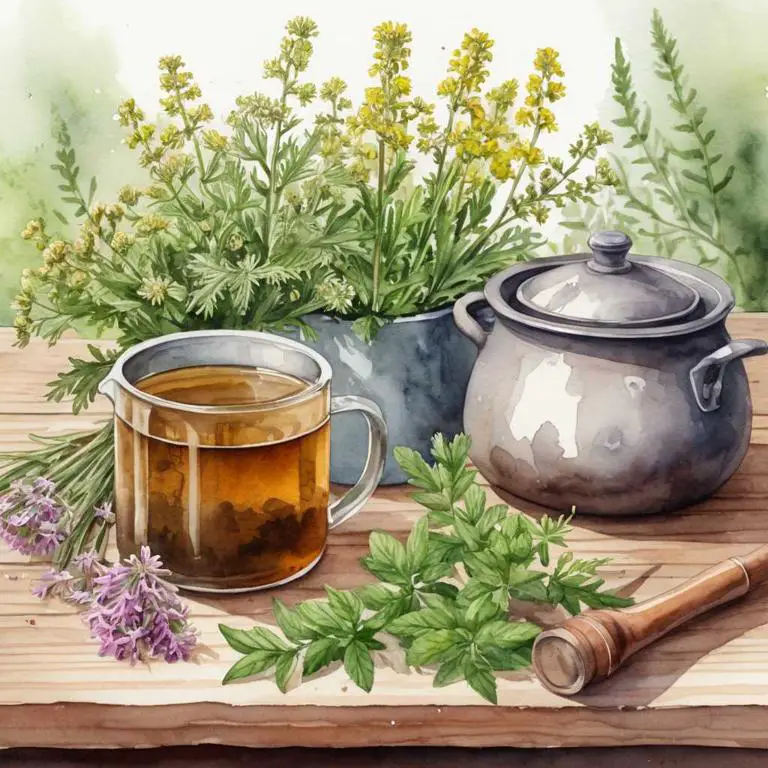
Herbal decoctions for jet lag are concentrated liquid extracts made from a combination of herbs, often used to alleviate the symptoms of jet lag.
These decoctions help by regulating sleep patterns, reducing stress and fatigue, and improving digestion, all of which are disrupted during long-distance travel. Examples include peppermint, ginger, and valerian root decoctions, which can be consumed as teas or added to baths for relaxation.
By incorporating these herbal remedies into their routine, travelers can improve the quality of their sleep, reduce jet lag symptoms, and enjoy a smoother transition to new time zones.
The following article describes in detail the most important decoctions for jet lag, including medicinal properties, parts of herbs to use, and recipes for preparations.
- 1. Valeriana officinalis
- 2. Passiflora incarnata
- 3. Lavandula angustifolia
- 4. Matricaria chamomilla
- 5. Glycyrrhiza glabra
- 6. Tilia platyphyllos
- 7. Melissa officinalis
- 8. Avena sativa
- 9. Rosa x rugosa
- 10. Ziziphus jujuba
- What is the best combination of herbal decoctions to use for jet lag?
- What ailments similar to jet lag are treated with herbal decoctions?
1. Valeriana officinalis
Valerian decoctions helps with jet lag because it promotes relaxation and reduces stress.
When our bodies are subjected to sudden time changes, it can disrupt our natural rhythms and make us feel tired, anxious, or irritable. Valerian's calming properties help regulate the body's internal clock by promoting a sense of calm and tranquility, allowing us to adjust to new sleep schedules more easily.
As a result, valerian decoctions can help alleviate symptoms of jet lag, such as insomnia, fatigue, and restlessness, making it an effective natural remedy for travelers.
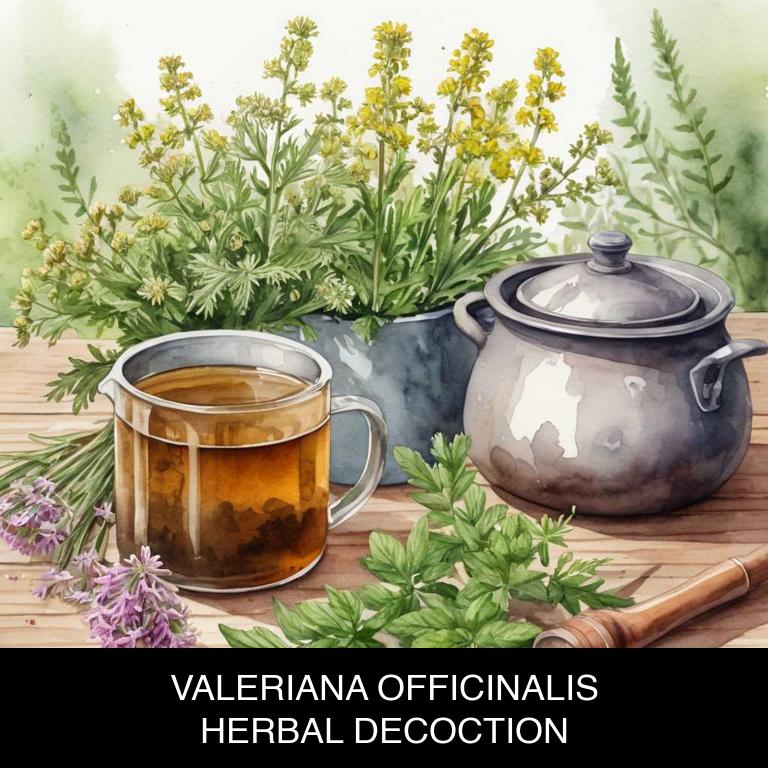
Medicinal Constituents
The list below shows the primary medicinal constituents in Valeriana officinalis decoctions that help with jet lag.
- Valerenic acid: This terpene helps with jet lag by promoting relaxation and reducing stress caused by disrupted sleep patterns.
- Valeranone: This sesquiterpene has sedative properties that can help regulate the body's internal clock and improve sleep quality, which can be affected by jet lag.
- Isovaleric acid: This fatty acid has a calming effect on the nervous system and may help reduce symptoms of jet lag such as fatigue, anxiety, and restlessness.
Parts Used
The list below shows the primary parts of valerian used to make decoctions for jet lag.
- Roots: Rich in valerenic acid, a key compound responsible for its sedative and sleep-promoting effects.
- Stems: Contain valerenic acid and other bioactive compounds that help regulate sleep patterns and reduce anxiety.
- Leaves: Also contain valerenic acid, which is believed to help alleviate insomnia and promote relaxation for better sleep.
Quick Recipe
The following recipe gives a procedure to make a basic valerian for jet lag.
- Gather 2-3 teaspoons of dried valeriana officinalis root and 1 quart of water for decoction.
- Combine the dried root with water in a saucepan and bring to a boil.
- Reduce heat to a simmer for 5-10 minutes to release the root's medicinal properties.
- Strain the decoction through a cheesecloth into a clean container to remove the solids.
- Store the decoction in a sealed container in the refrigerator for up to 3 days.
2. Passiflora incarnata
Maypop decoctions helps with jet lag because its unique blend of flavonoids, terpenes, and alkaloids works to regulate the body's internal clock and alleviate symptoms of fatigue.
The decoction's calming effects can help ease anxiety and promote relaxation, making it easier to adjust to new time zones.
Additionally, maypop's ability to stimulate digestion and improve sleep quality ensures that you'll feel rested and refreshed upon arrival at your destination.
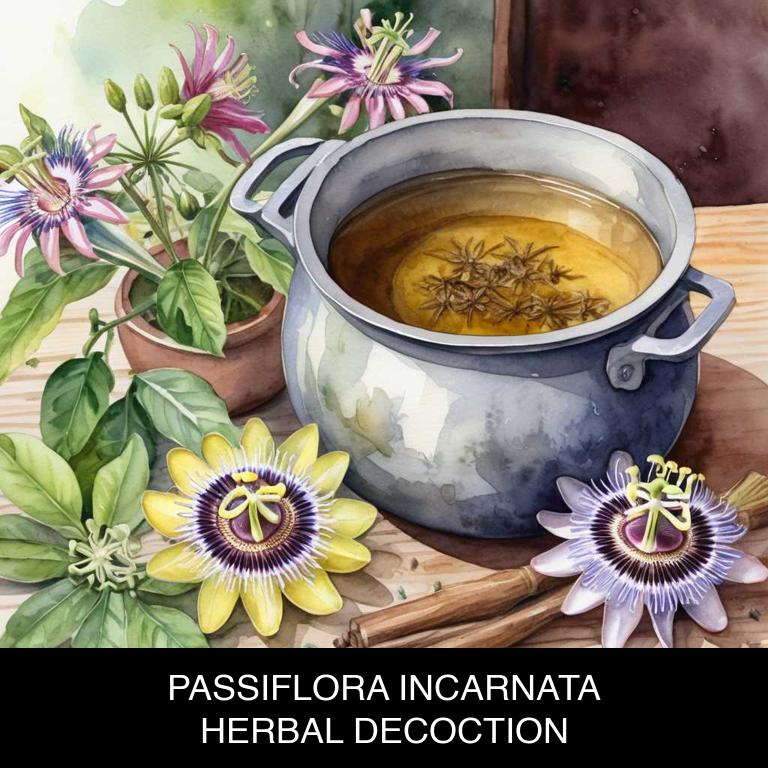
Medicinal Constituents
The list below shows the primary medicinal constituents in Passiflora incarnata decoctions that help with jet lag.
- Flavonoids: These compounds help alleviate jet lag by reducing inflammation and promoting relaxation, which can aid in readjusting to a new sleep schedule.
- Herniarin: This flavonoid derivative may assist in reducing the effects of jet lag by acting as a natural sedative, promoting better sleep quality, and reducing stress caused by travel.
- Isosakuranetin: This flavonoid is believed to play a role in alleviating jet lag by exerting antioxidant and anti-inflammatory properties, which can help mitigate the negative effects of travel on the body's internal clock.
Parts Used
The list below shows the primary parts of maypop used to make decoctions for jet lag.
- Leaves: They contain the highest concentration of flavonoids and other active compounds responsible for the sedative effects, which help alleviate jet lag symptoms.
- Roots: The root of the plant is rich in alkaloids and flavonoids that promote relaxation, reduce anxiety, and improve sleep quality, essential for adapting to new time zones.
- Fruits: The fruit of Passiflora incarnata, also known as the maypop, contains a high concentration of flavonoids, vitamins, and minerals that contribute to its calming and sleep-promoting properties.
Quick Recipe
The following recipe gives a procedure to make a basic maypop for jet lag.
- Gather 2-3 grams of dried passiflora incarnata flowers and 1 liter of boiling water.
- Steep the herbal material in the boiling water for 5-10 minutes or until it reaches the desired strength.
- Strain the liquid through a cheesecloth or a fine-mesh sieve into a clean container.
- Discard the solids and let the decoction cool to room temperature for 30 minutes to an hour.
- Store the cooled decoction in a dark glass bottle in the refrigerator for up to 3 days.
3. Lavandula angustifolia
English lavender decoctions helps with jet lag because its soothing properties promote relaxation and calmness, easing the body's transition across time zones.
The natural antispasmodic and anti-inflammatory compounds in lavender work to reduce stress and anxiety caused by travel disruptions. As a gentle sedative, it can help regulate sleep patterns and improve the quality of rest, allowing the body to adjust to its new environment more efficiently.
This natural remedy supports a healthier adaptation to jet lag, leaving travelers feeling refreshed and revitalized.
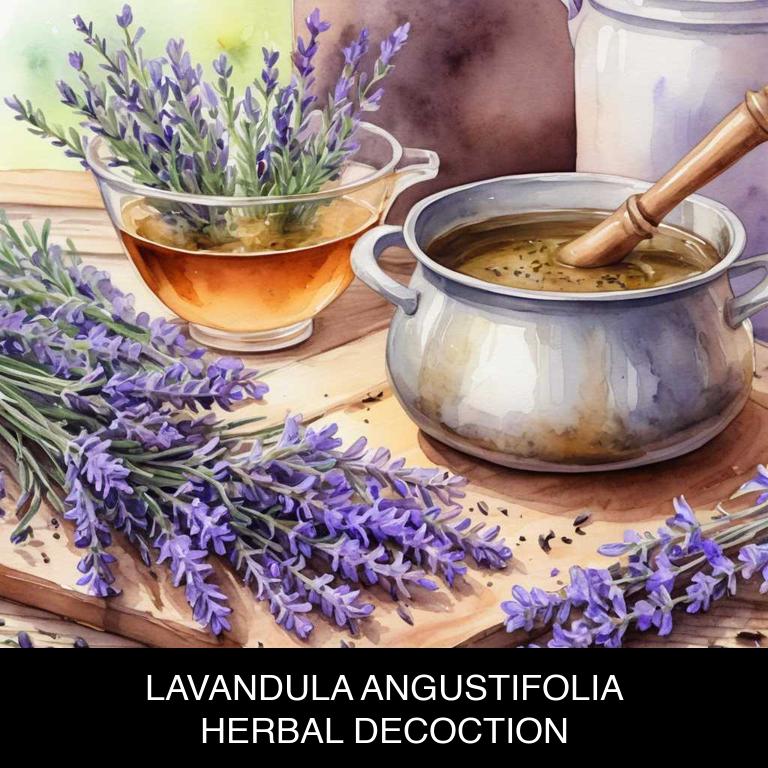
Medicinal Constituents
The list below shows the primary medicinal constituents in Lavandula angustifolia decoctions that help with jet lag.
- Linalool: A terpene that helps regulate the body's circadian rhythms and promotes relaxation, which can aid in adjusting to a new time zone.
- Linalyl acetate: A terpene that has sedative properties and can help reduce stress and anxiety caused by jet lag, promoting a restful night's sleep.
- Luteolin: A phenolic compound that has antioxidant properties and can help mitigate the negative effects of jet lag on the body, such as inflammation and oxidative stress.
Parts Used
The list below shows the primary parts of english lavender used to make decoctions for jet lag.
- Leaves: Lavandula angustifolia leaves are used in decoctions for jet lag due to their calming properties, which help regulate sleep patterns.
- Flowers: Lavandula angustifolia flowers are used in decoctions for jet lag as they have a soothing effect, aiding in relaxation and reducing stress caused by travel.
- Stems: Lavandula angustifolia stems are used in decoctions for jet lag due to their mild sedative properties, which can help alleviate symptoms of insomnia and fatigue.
Quick Recipe
The following recipe gives a procedure to make a basic english lavender for jet lag.
- Harvest fresh or dried lavandula angustifolia flowers in the morning after the dew has evaporated for best quality.
- Dry the harvested flowers in a warm place or using a food dehydrator to remove moisture completely.
- Combine 1 teaspoon of dried lavandula angustifolia flowers with 1 cup of boiling water in a heat-resistant container.
- Steep the mixture for 5-7 minutes to allow the flowers to release their active compounds and oils.
- Strain the decoction through a cheesecloth or a fine-mesh sieve into a cup or glass bottle for consumption.
4. Matricaria chamomilla
Chamomile decoctions helps with jet lag because its soothing properties can calm the mind and body, allowing for a smoother transition across time zones.
The apigenin content in chamomile binds to GABA receptors in the brain, promoting relaxation and reducing stress levels. This, in turn, helps regulate the body's natural circadian rhythms, making it easier to adjust to new sleep patterns and wake-up times.
As a result, chamomile decoctions can help alleviate symptoms of jet lag, such as insomnia, fatigue, and disorientation, allowing travelers to feel more refreshed and revitalized upon arrival at their destination.
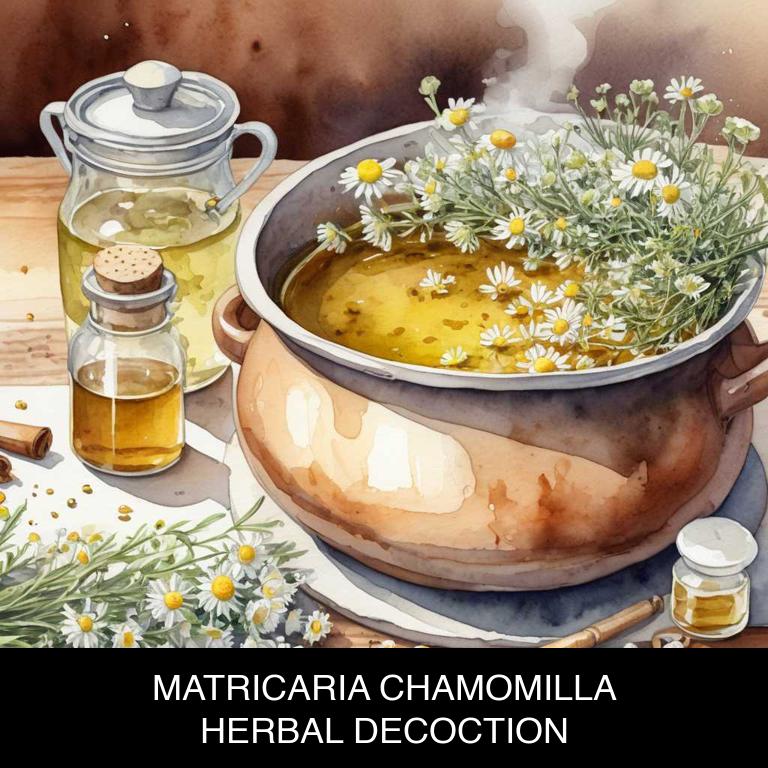
Medicinal Constituents
The list below shows the primary medicinal constituents in Matricaria chamomilla decoctions that help with jet lag.
- Apigenin: As a flavonoid, apigenin helps with jet lag by reducing inflammation and promoting relaxation, which can aid in adapting to new time zones.
- Luteolin: This flavonoid has been shown to have antioxidant properties, which can help mitigate the oxidative stress caused by jet lag and promote better sleep quality.
- Α-bisabolol: A sesquiterpene with anti-inflammatory and soothing properties, α-bisabolol can help alleviate symptoms of jet lag such as fatigue, anxiety, and digestive issues.
Parts Used
The list below shows the primary parts of chamomile used to make decoctions for jet lag.
- Flowers: They are commonly used due to their calming and soothing properties, which can help alleviate symptoms of jet lag such as insomnia and anxiety.
- Leaves: They are often utilized in decoctions to provide a gentle sedative effect and promote relaxation, which is beneficial for individuals experiencing jet lag.
- Seeds: Although not as commonly mentioned as flowers, the seeds of Matricaria chamomilla are sometimes used in decoctions to enhance sleep quality and reduce stress related to jet lag.
Quick Recipe
The following recipe gives a procedure to make a basic chamomile for jet lag.
- Harvest matricaria chamomilla flowers in the morning after the dew has dried but before the heat of the day sets in.
- Dry the matricaria chamomilla flowers in a warm dry place out of direct sunlight for 1 to 2 weeks.
- Steep 1 to 2 teaspoons of dried matricaria chamomilla flowers in 1 cup of boiling water for 5 to 10 minutes.
- Strain the liquid through a fine mesh to remove the plant material and discard the solids.
- Drink the decoction 2 to 3 times a day as needed for relief from anxiety and insomnia symptoms.
5. Glycyrrhiza glabra
Licorice decoctions helps with jet lag because of its adaptogenic properties, which enable it to regulate the body's natural rhythms.
The decoction contains glycyrrhizin, a compound that helps to balance cortisol levels and promote relaxation, making it easier to adjust to new time zones. Additionally, licorice root has been shown to stimulate the production of melatonin, a hormone responsible for regulating sleep-wake cycles.
By promoting a sense of calm and reducing jet lag symptoms, herbal licorice decoctions can help you feel more refreshed and prepared for your travels.

Medicinal Constituents
The list below shows the primary medicinal constituents in Glycyrrhiza glabra decoctions that help with jet lag.
- Glycyrrhizin: A saponin glycoside that helps with jet lag by stabilizing the body's circadian rhythms, thereby reducing the impact of time zone changes on the body's internal clock.
- Licorice flavonoids: Flavonoids like luteolin, quercetin, and kaempferol have antioxidant and anti-inflammatory properties, which help in reducing fatigue and promoting better sleep quality, crucial for overcoming jet lag.
- Liquiritin: A triterpenoid saponin that exhibits anti-stress properties by reducing cortisol levels and promoting relaxation, which can help the body adjust to the new time zone and reduce jet lag symptoms.
Parts Used
The list below shows the primary parts of licorice used to make decoctions for jet lag.
- Roots: Roots: The most used part of Glycyrrhiza glabra in decoctions for jet lag is its roots due to their high glycyrrhizin content, which helps regulate cortisol levels and alleviate symptoms of jet lag.
- Barks: Barks: The barks of Glycyrrhiza glabra are also used in decoctions for jet lag due to their ability to balance cortisol levels and promote a sense of well-being, essential for recovering from jet lag.
- Flowers: Flowers: The flowers of Glycyrrhiza glabra are used to make decoctions for jet lag due to their anti-inflammatory properties, which help alleviate the fatigue and stress associated with jet lag.
Quick Recipe
The following recipe gives a procedure to make a basic licorice for jet lag.
- Harvest fresh or dried roots of the plant in the fall season when the plant is fully matured.
- Wash the roots thoroughly with cold water to remove any dirt or debris.
- Chop the roots into small pieces and weigh out 5-7 grams for each 250 milliliters of water.
- Steep the chopped roots in boiling water for 10-15 minutes to release the active compounds.
- Strain the decoction through a cheesecloth or a fine-mesh sieve into a clean container.
6. Tilia platyphyllos
Broad-leaved lime decoctions helps with jet lag because of its unique combination of flavonoids, phenolic acids, and essential oils.
These compounds have been shown to regulate circadian rhythms and reduce symptoms of jet lag such as fatigue, insomnia, and digestive issues. The decoction's soothing properties can also calm the nervous system, promoting a sense of balance and relaxation.
As a result, it can help the body adjust to new time zones more quickly and naturally, making it an effective natural remedy for combating the effects of jet lag.
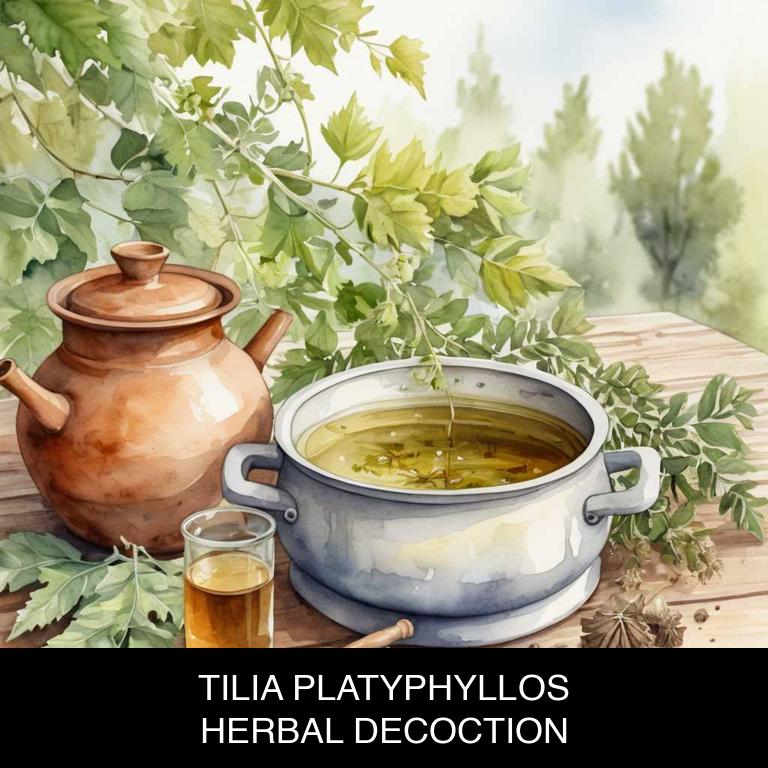
Medicinal Constituents
The list below shows the primary medicinal constituents in Tilia platyphyllos decoctions that help with jet lag.
- Flavonoids: These compounds help with jet lag by reducing inflammation and promoting relaxation, which can aid in adjusting to a new sleep-wake cycle.
- Triterpenes: Triterpenes like Ursolic Acid have antioxidant properties that can help reduce fatigue and stress associated with jet lag.
- Phenylethanoid glycosides: These compounds may help with jet lag by reducing anxiety and promoting a sense of calm, which can be beneficial for travelers adjusting to a new time zone.
Parts Used
The list below shows the primary parts of broad-leaved lime used to make decoctions for jet lag.
- Leaves: Used to make decoctions for their sedative and calming effects, which may help with jet lag symptoms.
- Buds: Used to make decoctions for their expectorant properties, which may help alleviate congestion and fatigue associated with jet lag.
- Barks: Used to make decoctions for their anti-inflammatory and sedative properties, which may help with sleep disturbances and stress caused by jet lag.
Quick Recipe
The following recipe gives a procedure to make a basic broad-leaved lime for jet lag.
- Gather 20-30 grams of dried tilia platyphyllos flowers and leaves.
- Combine the gathered herbs in a saucepan and add 2 liters of cold water.
- Heat the mixture over medium heat for 10-15 minutes to facilitate infusion.
- Reduce the heat to low and simmer for 5-7 minutes to extract active compounds.
- Strain the decoction through a cheesecloth into a clean container to remove solids.
7. Melissa officinalis
Lemon balm decoctions helps with jet lag because its calming properties help regulate sleep patterns and reduce stress caused by time zone changes.
The soothing aroma of lemon balm also promotes relaxation, making it easier to fall asleep in a new environment. Additionally, its mild sedative effects can help alleviate anxiety and irritability that often accompany jet lag.
By sipping on a warm cup of lemon balm tea before bedtime, travelers can gently adjust their body's internal clock and wake up feeling refreshed and rejuvenated upon arrival at their destination.
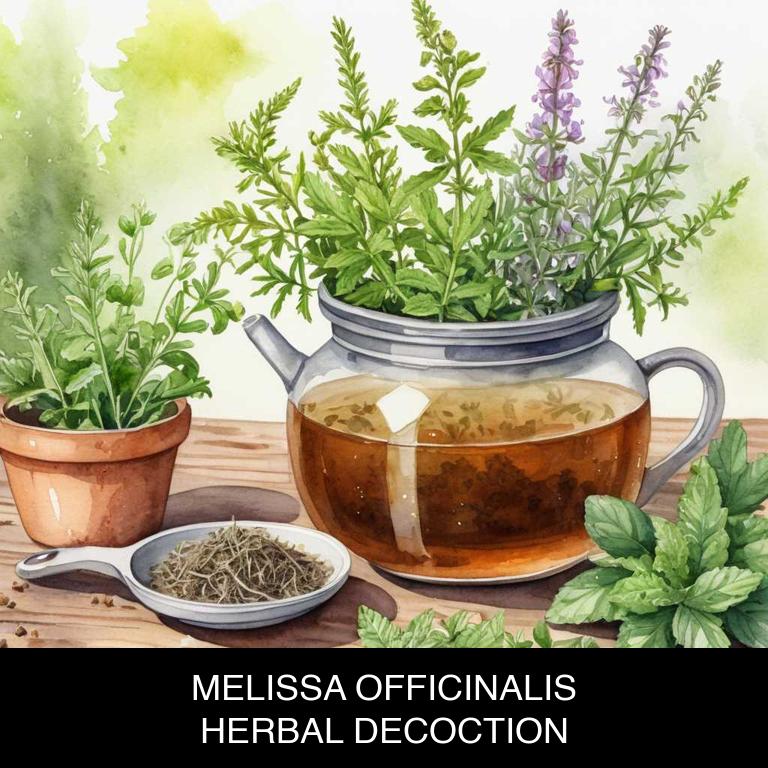
Medicinal Constituents
The list below shows the primary medicinal constituents in Melissa officinalis decoctions that help with jet lag.
- Rosmarinic acid: This phenolic compound helps alleviate jet lag symptoms by reducing oxidative stress and inflammation caused by disrupted circadian rhythms.
- Linalool: As a terpene, linalool promotes relaxation and improves sleep quality by interacting with the body's GABA receptors, which helps to regulate the sleep-wake cycle.
- Limonene: This monoterpene has a mood-boosting effect and can help regulate the body's internal clock by influencing the expression of genes involved in circadian rhythm regulation.
Parts Used
The list below shows the primary parts of lemon balm used to make decoctions for jet lag.
- Leaves: Melissa officinalis leaves are commonly used due to their high content of essential oils, particularly linalool and linalyl acetate, which have sedative and calming properties to aid in sleep and relaxation.
- Stems: Melissa officinalis stems are used in decoctions due to their ability to promote relaxation and reduce stress, making it easier to adjust to a new time zone.
- Roots: Melissa officinalis roots are used for their adaptogenic properties, helping the body to adapt to new environments and rhythms, and also for their calming effects on the nervous system.
Quick Recipe
The following recipe gives a procedure to make a basic lemon balm for jet lag.
- Gather 2-4 grams of dried melissa officinalis leaves and flowers from a trusted supplier.
- Combine the herb with 200-250 ml of boiling water in a heat-resistant glass container.
- Steep the mixture for 5-7 minutes to allow the herbal compounds to infuse into the water.
- Strain the decoction using a fine-mesh sieve or cheesecloth to remove the solids.
- Store the cooled decoction in an airtight container in the refrigerator for up to 24 hours.
8. Avena sativa
Oats decoctions helps with jet lag because they promote relaxation, calmness, and a sense of grounding.
The soothing properties of oats can help to ease the stress and anxiety that often accompanies travel across time zones. As our bodies adjust to new rhythms, oats decoctions can provide a gentle and calming influence, helping to regulate our sleep patterns and reduce the symptoms of jet lag.
Additionally, oats are rich in fiber and antioxidants, which can also support overall well-being and vitality during periods of transition.
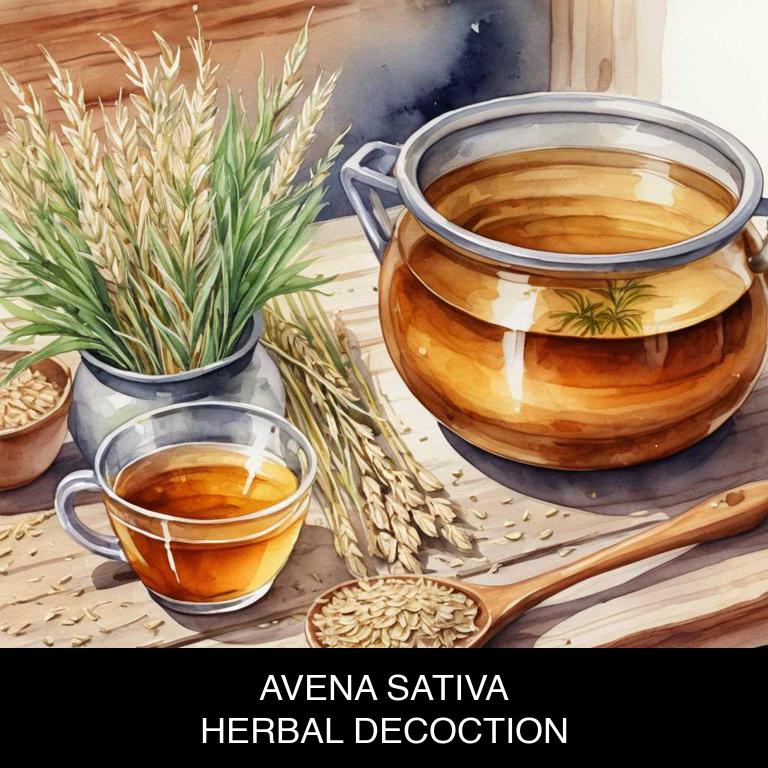
Medicinal Constituents
The list below shows the primary medicinal constituents in Avena sativa decoctions that help with jet lag.
- Avenacoside: Avenacoside, a saponin glycoside found in Avena sativa, has been shown to have sedative and anti-anxiety properties, which may help individuals adjust to new sleep schedules and reduce jet lag symptoms.
- Ferulic acid: Ferulic acid, a phenolic compound present in Avena sativa, has antioxidant and anti-inflammatory properties, which may help mitigate the negative effects of jet lag on the body, such as oxidative stress and inflammation.
- Lignans: Lignans, a type of phytoestrogen found in Avena sativa, have been shown to have antioxidant and anti-anxiety effects, which may help reduce stress and promote relaxation, making it easier to adjust to a new time zone.
Parts Used
The list below shows the primary parts of oats used to make decoctions for jet lag.
- Seeds: They contain a higher concentration of nutrients and saponins, which are believed to help alleviate symptoms of jet lag.
- Roots: They are thought to have a balancing effect on the body's internal clock and promote relaxation.
- Leaves: They contain flavonoids and phenolic acids, which may help regulate sleep patterns and reduce stress caused by jet lag.
Quick Recipe
The following recipe gives a procedure to make a basic oats for jet lag.
- Harvest 1 part of avena sativa roots and 2 parts of leaves and stems from a trusted source.
- Cut the avena sativa into small pieces to release their active compounds for infusion.
- Combine 1 teaspoon of the cut avena sativa with 1 cup of boiling water in a heat-resistant container.
- Steep the mixture for 5-7 minutes or until the liquid has reduced by half its original volume.
- Strain the decoction through a cheesecloth or a fine-mesh sieve into a clean container.
9. Rosa x rugosa
Beach rose decoctions helps with jet lag because they promote relaxation, reduce stress, and regulate the body's natural rhythms.
The calming properties of beach rose help to ease the discomfort and fatigue that often accompanies time zone changes.
By promoting a sense of tranquility and calm, beach rose decoctions can help your body adjust more easily to its new surroundings, reducing the symptoms of jet lag and allowing for a smoother transition into your new environment.
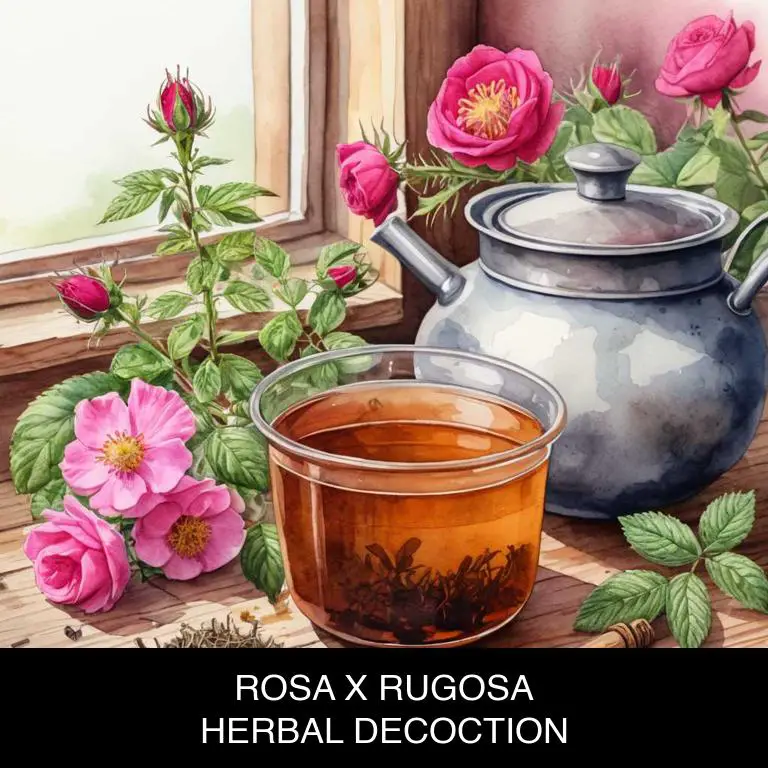
Medicinal Constituents
The list below shows the primary medicinal constituents in Rosa x rugosa decoctions that help with jet lag.
- Flavonoids: These plant-based compounds have antioxidant properties, which can help counteract oxidative stress caused by jet lag-related changes in circadian rhythms and sleep patterns.
- Rosmarinic acid: As a polyphenolic compound, rosmarinic acid has been shown to have a regulating effect on the body's internal clock and can help mitigate the effects of jet lag by stabilizing circadian rhythm.
- Geraniol: This terpene has been found to have a sedative and hypnotic effect, which might help promote relaxation and improve sleep quality, making it easier to adjust to a new time zone.
Parts Used
The list below shows the primary parts of beach rose used to make decoctions for jet lag.
- Roots: Rosa x rugosa roots are used due to their adaptogenic properties, which help the body adapt to changes in environment and rhythm.
- Leaves: Rosa x rugosa leaves are used because they contain antioxidants and flavonoids that can help regulate the body's internal clock and reduce fatigue associated with jet lag.
- Flowers: Rosa x rugosa flowers are used due to their calming effects and ability to promote relaxation, which can aid in readjusting to a new time zone.
Quick Recipe
The following recipe gives a procedure to make a basic beach rose for jet lag.
- Gather rosa x rugosa flowers and leaves in a quantity of 30 grams for every 1 liter of water.
- Dry the gathered plant material in a well-ventilated area for a period of 2 to 4 weeks.
- Combine 30 grams of the dried plant material with 1 liter of water in a saucepan.
- Boil the mixture for 5 to 10 minutes then reduce heat for a further 10 to 15 minutes.
- Strain the decoction using a cheesecloth or a fine mesh and discard the solids.
10. Ziziphus jujuba
Chinese date decoctions helps with jet lag because they promote natural sleep-wake cycles and calmness.
The herbal blend, often combining dates, licorice root, and other soothing ingredients, gently adjusts the body's internal clock to local time zones. As the warm, comforting liquid is sipped, it calms the mind and reduces stress, allowing the body to relax and prepare for a restful night's sleep.
With regular use, jet lag symptoms such as fatigue, insomnia, and disorientation begin to subside, making it easier to adjust to new time zones.
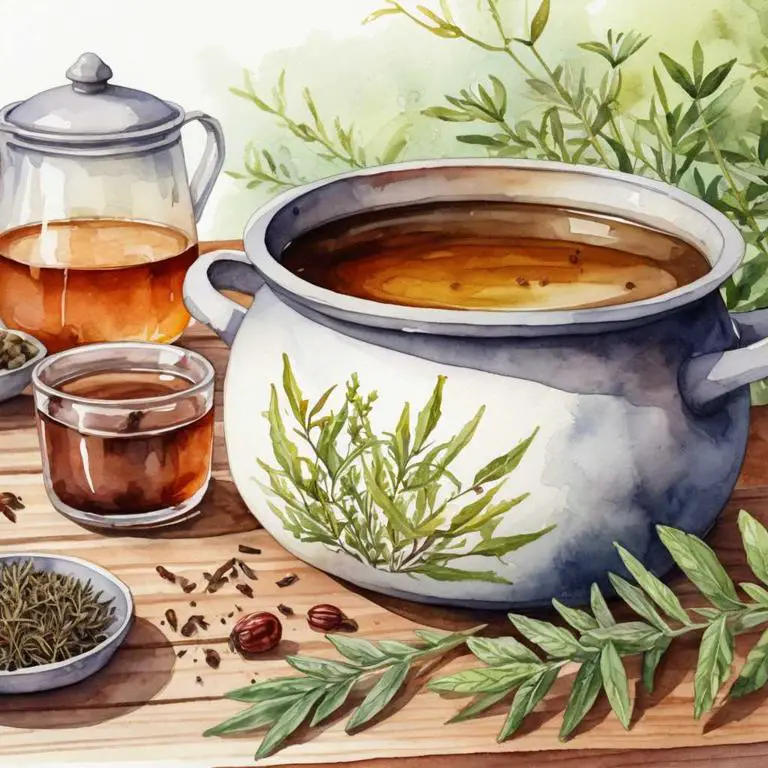
Medicinal Constituents
The list below shows the primary medicinal constituents in Ziziphus jujuba decoctions that help with jet lag.
- Flavonoids: These plant compounds may help mitigate jet lag by reducing inflammation and improving sleep quality due to their antioxidant properties.
- Saponins: Saponins in Ziziphus jujuba may aid in regulating circadian rhythms and promoting relaxation, which can help alleviate jet lag symptoms.
- Phenolic acids: These compounds may help stabilize the body's internal clock and reduce oxidative stress, contributing to improved sleep and reduced jet lag symptoms.
Parts Used
The list below shows the primary parts of chinese date used to make decoctions for jet lag.
- Fruits: They are used due to their adaptogenic properties, which help regulate the body's internal clock and reduce fatigue associated with jet lag.
- Barks: The barks are utilized for their calming effects, which can help alleviate stress and promote a restful sleep, crucial for recovering from jet lag.
- Leaves: The leaves are used due to their antioxidant properties, which can help reduce inflammation and oxidative stress caused by long-distance travel and time zone changes.
Quick Recipe
The following recipe gives a procedure to make a basic chinese date for jet lag.
- Harvest 250g of dried ziziphus jujuba fruit from a trusted source and clean it thoroughly.
- Crush the dried fruit into a fine powder using a mortar and pestle for 5 minutes.
- Combine 2g of the powder with 1 liter of boiling water in a heat-resistant container.
- Steep the mixture for 30 minutes and then strain it through a cheesecloth into a separate container.
- Store the decoction in the refrigerator and consume 20-30ml of it 2-3 times a day.
What is the best combination of herbal decoctions to use for jet lag?
The best combination of herbal decoctions that help with jet lag is a blend of Peppermint, Ginger, and Ashwagandha.
Peppermint soothes digestive issues and calms the mind, while Ginger warms the body and aids in circulation. Ashwagandha, an adaptogenic herb, helps regulate the body's internal clock and reduces stress.
Combine these decoctions in equal parts, steep them in hot water for 5-7 minutes, and drink before bedtime or upon waking to help alleviate jet lag symptoms and promote a smooth transition to a new time zone.
What ailments similar to jet lag are treated with herbal decoctions?
Ailments similar to jet lag that are treated with herbal decoctions are those caused by disruptions in the body's natural rhythms, such as insomnia, fatigue, and digestive issues.
Herbal remedies like valerian root, chamomile, and lavender can help calm the mind and promote relaxation, while others like ashwagandha, ginseng, and ginger can boost energy levels and reduce inflammation.